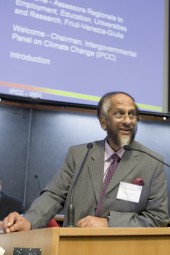Personal tools
News from ICTP 112 - Commentary

A September 2004 ICTP workshop marked the launch of the fourth assessment report of the Intergovernmental Panel on Climate Change (IPCC). IPCC's chairman, who attended the workshop, explains what lies ahead.
Making Sense of Climate Change
In the summer of 2003 a scorching
three-month heat wave in Europe left more than 34,000 dead. In
early 2002, a chunk of ice 3200 square kilometres in size (that's
larger than the island of Bali) broke off the Larsen ice shelf
and slid into the Southern Ocean. In the summer of 2004 a series
of hurricanes---four in six weeks---swept across the Caribbean
and the southern United States. More than 2000 people in Haiti
alone fell victim to the storms' wrath.
Are these extreme weather-related events due to climate change?
No scientist can say for sure although many have predicted that
rising global temperatures are making our weather and climate
not only warmer, wetter and windier but more unpredictable and
violent.
This much we do know. Over the past 150 years the average global
mean temperature has risen 0.6 degrees Celsius. At the same time,
the amount of carbon dioxide in the atmosphere has risen from
280 parts per million to 380 parts per million.
Coincidence or correlation? The vast majority of scientists think
the latter and recent trends seem to confirm their concerns: the
1990s were the warmest decade since the mid 1800s and 1998 the
warmest year on record. The size of the snow pack on Kilimanjaro
has melted by 80 percent since 1912 and Arctic sea ice has retreated
some 10 percent each decade since the mid 1970s. Average global
sea levels have risen 20 centimetres over the past 100 years.
Evidence of global climate change and its impact now stretch from
the Arctic to the tropics to Antarctica---and to all points in
between.
Since 1990, the Intergovernmental Panel on Climate Change (IPCC),
a joint project of the United Nations Environment Programme (UNEP)
and the World Meteorological Organization (WMO), has issued a
series of assessment reports---three in all---that have provided
an extensive review of the latest climate change research. I think
it's fair to say that what the public and public officials worldwide
know about this phenomenon has been largely conveyed to them through
IPCC publications, which have marshalled the talents and energy
of many hundreds of scientists, most of whom are the most eminent
researchers in their fields.

Rajendra K. Pachauri
In September 2004, members of the IPCC working group I, focusing
on the physical science of climate change, met at ICTP to launch
the fourth assessment. Some 150 climate scientist from more than
30 countries got together to begin the long and difficult process
of examining the current state of scientific knowledge of climate
change. The other two working groups in this latest IPCC effort
will examine issues related to climate change impacts, adaptation
and mitigation.
The first IPCC reports were published in 1990 with subsequent
reports coming out in 1995 and again in 2001. Together, they rank
among the most influential scientific reports of the past half
century, bringing the issue of climate change to the forefront
of public concern and enabling both public officials and the public
at large to gain important insights into the state of scientific
knowledge of what is arguably the most critical environmental
issue of our times.
The IPCC initiative has become more sophisticated with each new
round of study. Databases have become increasingly comprehensive
and computer models more exacting and precise. The fourth assessment,
whose reports are scheduled for publication in 2007, will likely
continue to make progress on the scientific front by filling gaps
in our knowledge and enabling experts to convey their scientific
findings with greater confidence.
The assessment will include many more scientists from the developing
world than previous assessments. In fact, we estimate that about
40 percent of the authors of the reports will be from the South.
The reports themselves will focus a great deal of attention on
the impact of climate change at the regional and local levels.
Growing scientific expertise throughout the developing world and
the increasing sophistication of computer technology will enable
us to explore climate change over broader areas and at smaller
scales than in the past. That's good news for both the developing
and developed worlds. After all, climate change is a global issue
and the more scientists know about this phenomenon, the more policy
makers will be able to respond effectively to an issue that is
likely to affect us all---now and for generations to come.
Rajendra K. Pachauri
Chairman
Intergovernmental Panel
on Climate Change (IPCC)
For additional information about IPCC, see www.ipcc.ch.